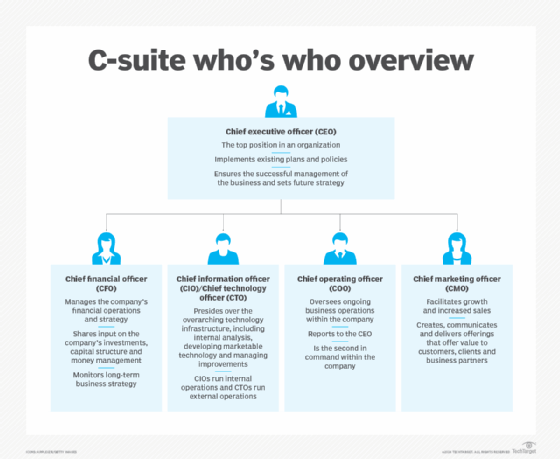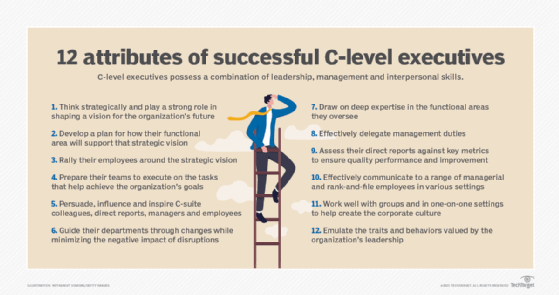What is executive leadership?
Executive leadership is the ability of those who manage or direct employees in an organization to influence and guide these individuals. Those in executive leadership positions typically oversee business activities such as fulfilling organizational goals, strategic planningdevelopment and overall decision making.
Executive leadership is typically distributed across the various divisions of the enterprise, collectively comprising the C-suite. The most typical roles include the following:
- Chief executive officer. The CEO is the highest-ranking executive leader, responsible for enterprise strategy and long-term goals. This person fosters an attitude of leadership development among the other lead executives.
- Chief financial officer. The CFO is responsible for enterprise accounting, financial planning and decisions, and compliance.
- Chief information officer. The CIO is responsible for IT operations and planning, data governance and management.
- Chief technology officer. The CTO is in charge of enterprise technology vision and implementation, and its alignment with business goals.
- Chief operating officer. The COO is in charge of day-to-day operations and continuity of management.
- Chief marketing officer. The CMO is responsible for developing and managing an organization's marketing and advertising programs.
- Vice president or executive director. This high-ranking executive is charged with implementing C-suite directives and initiatives as well as operational oversight. An executive director is usually department specific.
There are several different approaches to executive leadership, which any of the executive roles above could implement, including servant leadership, authentic leadership and paternalistic leadership. Characteristics of strong executive leaders include accountability, motivational leadership skills, problem solving abilities and extensive job experience in their profession.
Strong executive leaders also possess analytical skills to determine how to maximize employee productivity and derive the most business benefit from company resources. To do so, executive leaders use processes such as company and individual employee performance measurement as well as risk assessment and analysis. Other leadership traits such as empathy, willingness to collaborate and the ability to listen are especially valuable to successful executive leaders.
Executive leaders usually have a mix of soft skills and hard skills that are used to inspire employees and leverage their attributes to improve business processes. They also play a big role in developing and exemplifying their organization's corporate culture, including the degree of emphasis placed on various defining elements such as hierarchy, innovation, collaboration, competition, community involvement and social engagement.

Executive leadership for CIOs has become both more complicated and important as new concepts such as mobility, the internet of things and cloud computing have become vital to business success. Executive leaders must ensure these new technologies and concepts are properly integrated into company processes in a way that maximizes their business value while avoiding regulatory compliance or security risk.
Some examples of high-profile, successful executive leaders in recent decades include Apple CEO Steve Jobs' and successor Tim Cook, General Motors CEO Mary Barra, Microsoft founder Bill Gates, Amazon CEO Jeff Bezos, former Facebook COO Sheryl Sandberg, and Alibaba co-founder Jack Ma.
There are a variety of leadership education programs designed to promote executive management best practices, including those offered at various large universities. Some notable programs include the MIT Sloan School of Management, the Wharton School of the University of Pennsylvania and the Yale Global Executive Leadership Program.

What qualities make an effective executive leader?
An executive leader must possess the following qualities to be effective:
- Goal-oriented. An effective leader sets goals, focuses on them and inspires others to do the same.
- Decisive. An effective leader is decisive, and they aren't shy about making the call and going all-in once a decision is made.
- Confident. Executive leaders are steady and self-aware, believe in what they're doing, and cultivate that confidence in their teams.
- Positive. They focus on the positive and aren't diverted by challenges or discouragement.
- A team-builder. They assemble competent, can-do people around their goals and agendas as well as nurture mutual support and dependence throughout. Mentoring is part of the job.
- Accountable. They share their successes with the team and own their failures, with diligence in applying lessons learned to both.
- Purpose driven. They're committed to their vision for good reasons, are clear on what those reasons are and never lose sight of them. They embrace purpose and communicate it clearly to those around them.
However, the following traits aren't particularly helpful in an executive leader:
- Poor communication skills. Without the ability to get goals, purpose and values across, there's no path to success and little hope of strong team building.
- Lack of adaptability. The ability to adapt is essential. Without it, the best intentions can't keep the ship on course.
- Indifferent to feedback. Staying on course means taking cues from others when implementation falters or objectives drift. An inability to take those cues and accept suggestions from others can easily lead to failure.
How to become an effective executive leader
Those who aspire to executive leadership and wish to do it well can start by cultivating the following skills and traits:
- A proactive mindset. The effective executive takes the initiative, not waiting to be told what should happen next or what needs changing. They spot something that needs doing and get to work. This mindset can be applied in many areas of life, and once implemented, it becomes a default.
- Start networking. It's wise to network with other leaders, observe how they think and work, and discover what makes them effective. Mentoring sources can be found this way.
- Be a critical thinker. Effective executives are, by default, critical thinkers. This mindset can be cultivated in day-to-day living and is one that sticks.
- Focus on self-awareness. Self-awareness is essential. If it's lacking, it becomes an area requiring diligent development.
- Study leadership styles. These leadership styles are strong options that lead to opportunities. Examining them carefully and choosing the one that's the best fit for further development is preparation for success.
- Encourage others. Since an effective leader must be a good coach, it makes sense to cultivate the skill of building others up and empowering them -- not just team members but also people in all areas of life. Being an encourager isn't just an executive skill but a life skill.
Learn how the business world compares to the Olympics and how to lead a high-performance team.







